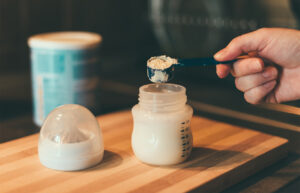Spis treści:
Właściwości marchewki
Marchew nie jest królową wartości odżywczej, wśród warzyw to taki „średniaczek”. Jednak ugotowana jest dobrze tolerowana przez małe brzuszki, dlatego stanowi bazę niemowlęcych zupek.
Marchew dostarcza przede wszystkim węglowodanów w postaci sacharozy czy skrobi zapasowej zgromadzonej w korzeniu, przez co jest dobrym źródłem energii. To także bogate źródło beta-karotenu, który w organizmie ulega przekształceniu w witaminę A – silny antyoksydant, który chroni komórki przed wolnymi rodnikami. Marchew dostarcza również wapnia, kwasu foliowego oraz błonnika pokarmowego regulującego pracę przewodu pokarmowego niemowlęcia.
Kiedy po raz pierwszy podać dziecku marchewkę?
Marchewka jest często pierwszym pokarmem stałym, jaki podaje się dziecku w czasie rozszerzania diety. Od kiedy warto ją podawać? Rozszerzanie, według aktualnych wytycznych, można zacząć najwcześniej w 17. tygodniu życia, najpóźniej w 26. tygodniu życia niemowlęcia.
Dlaczego marchewka jest dobrym wyborem na start? Wprowadzanie pokarmów stałych warto jest zacząć od warzywa, które ma lekko słodkawy posmak, ale nie jest tak słodkie, jak owoce. Nie zaczynaj rozszerzania od jabłka! Dlaczego?
Dzieci mają wrodzoną preferencję smaku słodkiego. Słodycz oznacza bowiem szybko i łatwo dostępną energię dla organizmu. Ze względu na obecność laktozy pokarm z piersi mamy również jest słodki. Jeśli, jako pierwszy pokarm poza mlekiem wprowadzisz jabłko czy inny owoc, to twojemu dziecku może być trudniej zaakceptować mniej słodkie lub nawet gorzkie w smaku warzywa.
Marchewka dla niemowlaka na start podczas rozszerzania diety jest zatem optymalnym wyborem, bo:
- jest warzywem,
- jest lekko słodka (ale nie tak, jak owoce),
- zazwyczaj jest dobrze tolerowana przez niedojrzały układ pokarmowy dziecka.
Inne warzywa, od których możecie zacząć przygodę z jedzeniem to bataty, ziemniaki czy dynia.
W jakiej formie podawać marchewkę dziecku?
To, w jakiej formie podasz pierwszą marchewkę dla niemowlaka zależy od stopnia gotowości dziecka. Przede wszystkim warto ocenić, czy dziecko stabilnie siedzi z podparciem czy wciąż chwieje się na boki.
Jeśli pozycja siedząca nie jest pewna, to do karmienia należy ułożyć dziecko w pozycji półsiedzącej, z wyraźnie uniesionym tułowiem, by możliwe było swobodne przełykanie. Możesz trzymać dziecko bokiem na kolanach, podpierając główkę na łokciu. Najważniejsze jest to, by zapobiegać zachłyśnięciu, bo niemowlę nie wie, jak się przełyka pokarmy stałe, dopiero będzie to trenować.
Marchewkę dla niemowlaka, który nie siedzi stabilnie warto podawać w formie dobrze zmiksowanego puree z marchewki, a wraz z czasem i możliwościami dziecka stopniowo zmieniać konsystencję marchewki na bardziej grudkowatą.
Jednak, jeśli niemowlę w momencie rozpoczęcia rozszerzania diety siedzi stabilnie, to można podać mu marchewkę także w formie stałej. Pamiętaj, by cały czas obserwować dziecko, być blisko, by móc zareagować na ewentualne zakrztuszenie.
Marchewkę podawaj dziecku ugotowaną. Surowa marchewka nie jest wskazana dla niemowlęcia, szczególnie przy pierwszych próbach z jedzeniem stałym. Surowe warzywa są ciężej strawne i bardzo trudno jest je pogryźć, dlatego upewnij się, że marchewka dla niemowlęcia jest miękka. Układ pokarmowy dziecka osiąga pełną dojrzałość dopiero około 10-12. miesiąca życia i do tego momentu należy dbać, by wszystkie posiłki były lekkostrawne.

Polecamy
Rozszerzanie diety a alergeny w diecie dziecka
Prawidłowe rozszerzanie diety dziecka to stopniowe wprowadzanie posiłków, które mu nie zaszkodzą, lecz będą pozytywnie wpływały na jego zdrowie. Niektóre produkty nie mogą być wprowadzane zbyt wcześnie, jednak nadmierna ostrożność i opóźnianie podawania dziecku wybranych pokarmów także mogą nieść za sobą negatywne skutki i przyczyniać się do rozwoju alergii pokarmowych. Kiedy wprowadzać potencjalne alergeny w diecie dziecka?
Jak zrobić marchewkę dla niemowlaka?
Przygotowując pierwszą marchewkę dla swojego dziecka, masz dwa wyjścia – możesz kupić gotowe puree z marchewki w słoiczku i wtedy pozostaje tylko delikatnie ją podgrzać lub samodzielnie ugotować marchewkę dla niemowlaka. Jak to zrobić?
Przede wszystkim zadbaj o dobrą jakość kupowanej marchewki. Marchew jest warzywem korzeniowym, które gromadzi średnie ilości pozostałości pestycydów i zazwyczaj nie stanowi zagrożenia dla konsumentów.
Jednak w przypadku żywienia niemowląt lepszym wyborem będzie marchew z upraw ekologicznych, bowiem dzieci ze względu na mniejszą masę ciała i mniejsze urozmaicanie diety są dużo bardziej narażone na potencjalne zanieczyszczenia. Poza tym niemowlę tej marchewki zjada dużo, także w kolejnych miesiącach już pod postacią np. zupek jarzynowych.
Jak ugotować marchewkę dla niemowlaka?
Zobacz, jak krok po kroku przygotować przecier z marchewki.
- Wybierz niewielką marchewkę i dokładnie ją umyj.
- Nie obieraj marchewki, dzięki temu w czasie gotowania straci mniej składników odżywczych.
- Ugotuj marchewkę na parze w parowniku lub na specjalnym sitku do garnka. Możesz też ugotować marchew w niewielkiej ilości wody.
- Ile gotować marchewkę dla niemowlaka? Niewielkie sztuki około 25 minut.
- Po lekki wystudzeniu obierz marchew, pokrój na mniejsze kawałki i ewentualnie zmiksuj na gładki przecier.
- Do gotowej marchewki dodaj kilka kropli oliwy z oliwek lub oleju rzepakowego. Dodatek tłuszczu ułatwia przyswajanie składników odżywczych.
Gotowe! Do miseczki przełóż niewielką ilość przecieru. Pozostałe puree możesz schować do lodówki na później (przechowuje przez maks. dobę) lub zamrozić. Wypróbuj metodę mrożenia w pojemnikach na lód (w kostkach). Dzięki temu zawsze masz pod ręką niewielką ilość marchewki.
Ile marchewki podać? Nie spodziewaj się, że dziecko od pierwszych prób będzie się najadać. Pierwszy kontakt z marchewką czy w ogóle żywnością stałą jest tylko po to, by się z danym produktem zapoznać. Dla dziecka jest to ogrom zupełnie nieznanych wrażeń, dlatego zazwyczaj kończy się na 1-3 łyżeczkach, a potem ilość zjadanej marchewki stopniowo rośnie.
Nie oczekuj, że smak marchewki czy innego produktu będzie od razu przez dziecko zaakceptowany. Czasem trzeba kilku, a nawet kilkunastu prób. Naturalne są zdziwione, wręcz oburzone miny w reakcji na smak marchewki, prawidłowe jest plucie czy smarowanie twarzy puree – to wszystko są elementy niesamowitego doświadczenia. Pozwól dziecku na nie!
Pamiętaj jednak, by nie wprowadzać marchewki po raz pierwszy, gdy dziecko jest głodne. Umiejętność jedzenia marchewki z łyżeczki czy w kawałkach wymaga skupienia, a irytacja związana z głodem nie sprzyja koncentracji i uważności.
Kiedy marchewka dla niemowlaka jest wskazana?
Marchewka dla niemowlaka jest dobrą bazą na start rozszerzania diety, ale to także składnik, który świetnie uzupełnia inne warzywa, kasze, mięso czy rybę. Dlatego marchew często stanowi podstawę bardziej złożonych zup czy dań obiadowych dla niemowląt w kolejnych etapach rozszerzania.
Zwracaj jednak uwagę, by nie było jej za dużo, bo to sprawia, że dania zaczną być monotonne smakowo, a okres wprowadzania nowych produktów jest między innymi po to, by wykształcić akceptację różnych smaków.
Duża ilość marchewki może sprzyjać zaparciom, szczególnie u dzieci karmionych mlekiem modyfikowanym. Do jednoskładnikowego przecieru z marchwi warto wracać wtedy, gdy dziecko ma biegunkę. Duża ilość skrobi w marchewce ułatwia ukształtowanie się prawidłowego stolca.
Przed wami pierwsza marchewka i początek wielkiej przygody z „dorosłym” jedzeniem. Powodzenia!
Źródła:
- De Cosmi V., Scaglioni S., Agostoni C., Early taste experiences and later food choices. Nutrients, 2017; 9(2): 107.
- Marta Jas-Baran, Tamara Chorążyczewska, „U malucha na talerzu”, wydawnictwo: Publicat.
- Szajewska H., Socha P., Horvath A. i wsp. Zasady żywienia zdrowych niemowląt. Stanowisko Polskiego Towarzystwa Gastroenterologii, Hepatologii i Żywienia Dzieci. Standardy Medyczne/Pediatria 2021, 18:805-822.
- Ryżko J, Ryżko J: Standardy Medyczne Pediatria Znaczenie błonnika w profilaktyce i leczeniu zaparć stolca u dzieci. 2012; 9: 79-85.









































